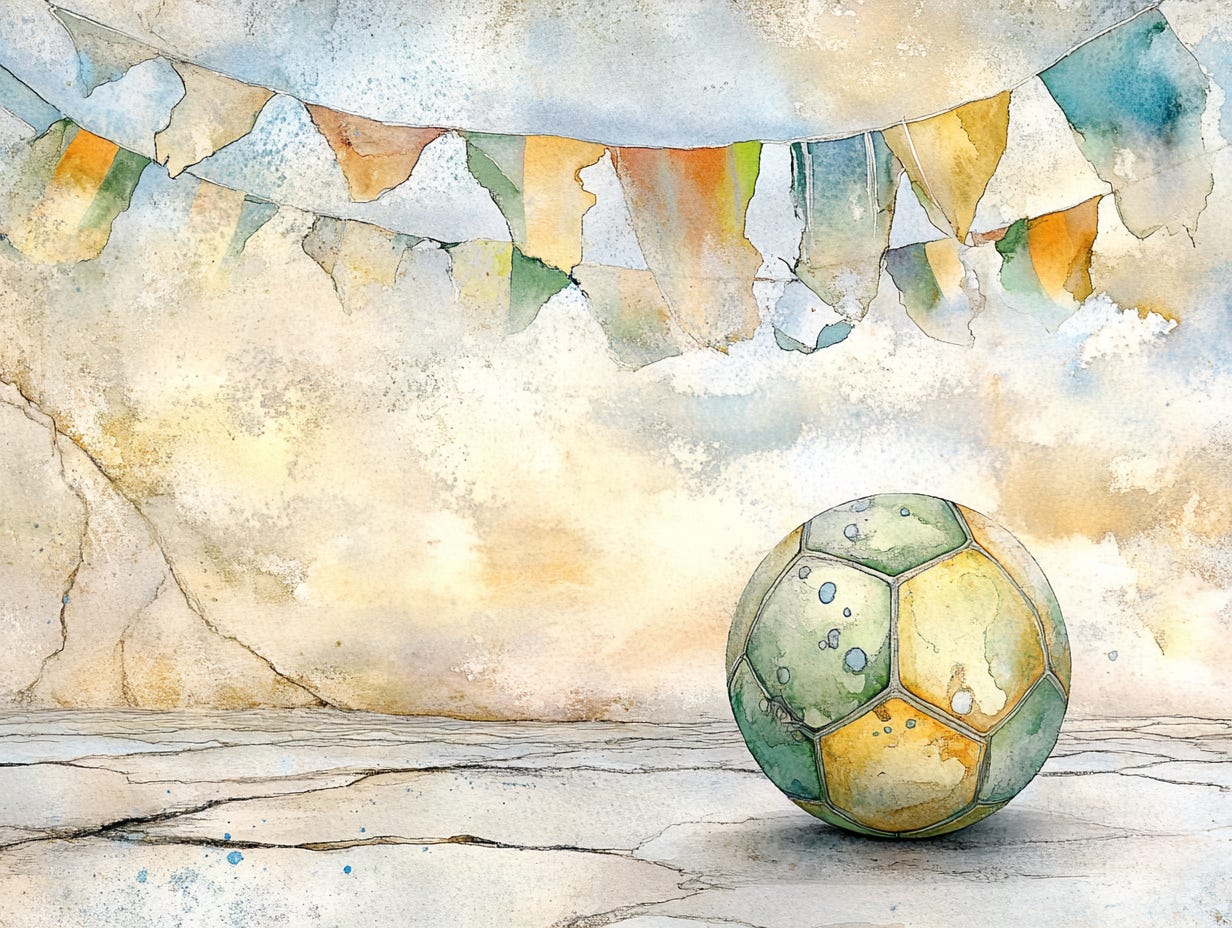I thought the world ended when Brazil lost the World Cup
Green and yellow everywhere, a sidewalk full of tears, and a girl learning just how much beauty and heartbreak the world could hold.
In 1998, we weren’t just watching the World Cup.
We were living it.
There were bandeirinhas—green and yellow little flags—strung across the streets like prayers. Storefronts painted with soccer dreams. Entire town squares transformed into open-air living rooms with radios, TVs, fireworks on standby.
During a Brazil game, the streets emptied out completely. Catechism was postponed. Doctor’s appointments were rescheduled. Even the priest would wrap up mass early with an encouragement to the national team.
For those 90 minutes (or longer), everyone was somewhere, worshipping a screen.
It wasn’t just soccer.
It was identity. Theater. Religion.
I remember that final match vividly. Brazil vs. France. July 12.
I was standing outside Aquarius, the only bar in town that we teenagers could call ours. The flags were still fluttering in the wind, like they didn’t know what had happened yet.
And I was crying on the sidewalk, inconsolable.
We’d lost the penta: the fifth title, the one we believed was ours by destiny.
My friends were sad, of course, but I was always the one who took things harder.
I felt it in my chest like a personal betrayal, a breakup I hadn’t seen coming.
The loss was stunning—but also strange, because we’d been so sure. So proud. So beautifully naive.
That game… it unraveled.
Ronaldo, our golden boy, wasn’t himself.
There were rumors even before kickoff: seizures, nerves, conspiracies.
Zidane scored twice before halftime, and though we hoped for a miracle, France sealed it with a third goal.
3–0.
Silence.
Then sobs. (Mostly mine.)
My dad had a habit, during past World Cups, of walking away from the television during penalties. He said he could feel his blood pressure spike. Said he needed to breathe or he might actually have a heart attack. That’s how serious it was. For him. For all of us.
But the World Cup wasn’t just intensity, it was intimacy.
It was the first time, every four years, when our little town cracked open and the whole planet came pouring in.
I watched people on TV who looked nothing like me.
I heard new anthems, learned about faraway customs, stared at the flags and languages scrolling across the screen like magic.
I memorized players’ names I couldn’t pronounce.
And yes, I’ll admit, I had a mild obsession with Japanese boys at that time.
Watching the tournament felt like being let into a candy store of cultures and men to admire.
It was also one of the few times I saw my town unified by something bigger than gossip, politics, or God.
During the World Cup, everyone had the same hope.
The same fear.
The same celebration dance ready to go.
People you barely said hi to would high-five you in the street after a goal.
It stitched us together: kids, elders, shopkeepers, teachers, the guy who barely spoke at the deli counter.
For a few short weeks, we were all part of something larger.
So when we lost… it felt like something cracked.
But the thing about hearts is: they break, and then they beat again.
The next day, the bell rang. The square filled back up.
The priest went back to preaching about eternal life instead of extra time.
And me? I stopped crying.
I wrote it all down.
Because even in that moment of sorrow, I knew I was witnessing something.
Not just a match, but a window.
A window into the world.
✶ This essay is part of From the Beginning, a personal series built from my diaries, one memory at a time. You’re reading 1998. Each piece revisits the girl I was, the world I came from, and the details I didn’t know I was already saving.


